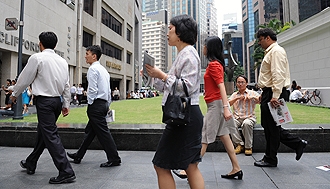
4 big-time benefits of flexible working hours in Singapore
Will part-time schemes lure job-seekers?
In a release, the Employer Alliance (EA) said hundreds of thousands of Singaporeans could re-enter the workforce and ease the nation's manpower shortage if more companies adopted flexible work arrangements.
It noted that by offering flexible work arrangements, companies can gain many benefits including:
Better talent attraction - According to MOM, more than 160,000 economically inactive residents want to find work during the next two years. Providing flexible work arrangements is the key to accessing this pool of talent;
Improved talent retention - Companies that can retain experienced and competent employees will have an edge and will be able to build a talent pipeline;
Increased productivity - Employees who know their company cares about their welfare are more engaged and willing to go the extra mile for their company; and
Cost savings - Higher retention rates will save time and money spent in recruitment and training of new hires. There will also be savings in downtime as new hires will also take time to build up their knowledge and experience. Mobile work, in particular, may result in savings in real estate.
There are more than 418,000 economically inactive residents aged 25 to 64, of which 336,000 are women. Of these, more than 160,000 want to find work during the next two years. However, many Singaporeans are unable to work on a full time basis due to their family commitments such raising young children or caring for elderly parents.
Flexible work arrangements such as working from home and part-time work will attract these residents back to work and increase the capacity of Singapore's workforce.
The traditional office based jobs from ‘9 to 5’ in many companies will also need to change if more flexible work opportunities are to be created. Singaporeans work some of the longest hours in the world - with many clocking up to 11 hours at work a day.
Two major reports commissioned by EA during the last three years have both found that the focus of employers on 'face-time' (the time an employee physically spends at their place of work) is a barrier to the introduction of flexible work arrangements.
Many employers still place a high value on 'face-time' which affects other areas such as compensation. Employees who do not put in the expected ‘face-time’ are perceived to be less committed to the company and seen as contributing less. But with more employees asking for flexible work arrangements, employers will be forced to change.
"In this difficult time of labour shortage, it is a waste of talent not to give Singaporeans who want to work the opportunity to do so. This means rethinking the way we want to work and how we integrate life needs and work expectations," Ms Claire Chiang, Chairperson of EA said.
"A review on work models and job functions is required where flexible and part-time work arrangements are seen as professional work options."
"Such part-time and flexible work arrangements help to expand a company’s capacity and capabilities. Greater use of flexible work arrangements leveraging technology will allow companies to tap a much larger pool of employees otherwise unavailable, including a large number of women and older workers with high skill levels," Ms Chiang said.
























 Advertise
Advertise









